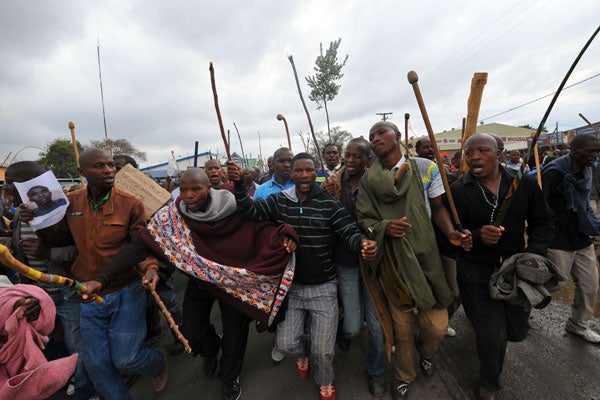South African Government Using Mining Industry as a Scapegoat for Shootings
Morgan Lorraine Roach /

Thousands of striking miners singing and carrying sticks march on the Lonmin Marikana mine on September 5 (photo: AFP).
The South African government has responded poorly to the shootings at the Lonmin mines. Instead of considering its own regulatory policies and the burdensome influence of unions, the government has blamed the mining industry for the tragedy.
Last month, workers at the Lonmin mine went on strike, demanding higher wages and improved safety standards. When miners allied with a rival union attempted to go to work over the weekend, they were attacked. The clashes resulted in 10 deaths.
The next week, South African police intervened, allegedly attempting to disperse the crowds with water cannons and rubber bullets. When miners armed with guns, machetes, and clubs continued their assault, police resorted to live ammunition, killing 34 people.
The tragedy at the Lonmin mine demonstrates the African National Congress’s (ANC) inability to create an economic framework that adequately addresses South Africa’s unemployment, poverty, and lack of development. Rather than create an environment in which South Africans are better positioned to advance economically, the government has enforced heavy-handed rules and regulations and has empowered politically connected unions. This has not only stifled business growth but has contributed to the ANC’s culture of corruption, patronage, and outright criminality.
In the case of the mining industry, the ANC blamed the Lonmin mining company for the shooting, claiming that the company failed to provide adequate working conditions. According to Minister of Mineral Resources Susan Shabangu, “Mining companies are not coming to the party as per their responsibilities.… If companies don’t comply, there will be consequences.… It will lead to fines. It will lead to closures of companies that do not comply.” Shabangu supports stricter compliance measures to address the livelihoods of mine workers.
Shabangu’s threat of increased government intervention is not the answer—it’s the problem. For example, earlier this year Lonmin reported a fall in platinum production, citing an increase in safety-related work stoppages imposed by the Department of Mineral Resources—this despite a reduction in fatalities from 2010.
Anglo American Platinum reported a doubling in mandated stoppages in 2011, some lasting over a week. The rising costs of electricity and labor and water shortages also contribute to the mining industry’s struggles to meet production targets.
Lonmin is not to blame for the shootings. The government is using the company as a scapegoat, failing to consider its own policies that affect the mining industry. Such a response will likely result in more regulations, increased challenges for South Africa’s mining industry, and a erosion the country’s international competitiveness.
